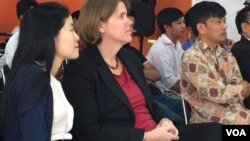Thirty-nine civic leaders and lawmakers, as well as university students, have said they will publicly declare their assets, in a show of transparency and a bid against corruption.
Speaking to more than 50 participants at a conference held at USAID's Development Innovation Institute on Monday, Kouy Meas Samnang, president of Accountability Cambodia, said asset declarations were a chance for public leaders to show their integrity and be a model for other groups.
“Showing that we’re clean via asset declaration means that we do not take any advantage of sponsors from other organizations,” he said.
The first to announce he would declare his assets was Chhang Youk, head of the Documentation Center of Cambodia. “Transparency will help contribute to the development of a nation that’s broken,” Chhang Youk said. “It provides a lot of positive points, in terms of maintaining people’s confidence and work effectiveness.”
The process may take some time, but he is determined to see it through, he said. “It should be a requirement for everybody,” he said.
Kuoy Meas Samnang said that when elections are near, asset declaration and other acts of transparency can attract support. “Any party who's willing to publicly declare its asset would be popular among the voters, I think,” he said.
Previous asset declarations that have not been made public did little to gain the people’s trust, he said.
Ho Vann, a lawmaker for the opposition Cambodia National Rescue Party, will take part in asset declaration. If the Rescue Party wins national elections in 2018, he intends to push for public declarations for all government officials, he said. It should also be mandatory, not voluntary, he said.
Phay Siphan, a spokesman for the Council of Ministers, said there should remain a balance between public, government and private information. Asset declaration is private, he said, according to the law. Asset declaration could pose a danger to the one who declares, so it should remain voluntary, he added.
Among those who declared assets for the conference were university students. One, Keo Chansour, had just two things to declare: a motorbike and a laptop, given to him by his mother. “Right now, I don’t have anything,” he said. “When I have a salary, I will show my cleanliness from zero.”







